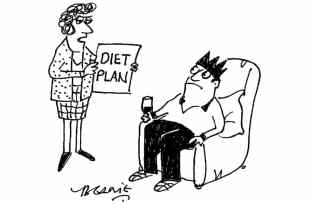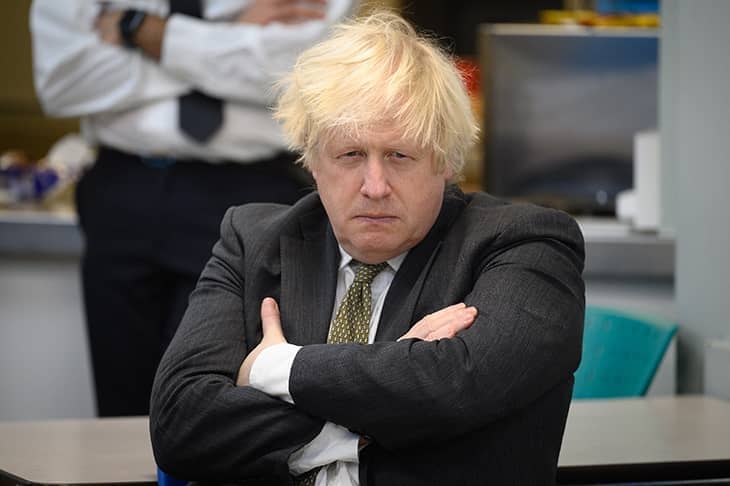In recent years, the notion of cabinet government has been a polite fiction. In theory, the prime minister is merely the first among equals when he meets his secretaries of state. In practice, they all owe their position to No. 10 and usually do what they’re told. The situation was summed up by an old Spitting Image sketch showing Margaret Thatcher at a restaurant with her cabinet ministers. She orders steak. ‘What about the vegetables?’ the waitress asks. ‘Oh,’ she replies, ‘they’ll have the same as me.’
For the first two years of Boris Johnson’s premiership, cabinet ministers were more claque than cabinet. ‘How many hospitals are we going to build?’ he asked at their first meeting after his general election victory. ‘40!’ came the response. ‘How many more nurses?’ ‘50,000!’ On it went. One minister recalls how when cabinet meetings went online at the start of the pandemic anyone who came off ‘mute’ was quickly re-muted by No. 10 civil servants. One secretary of state for a large department complains that Sir Patrick Vallance, the government’s chief scientific adviser, has far more power and influence than he does.
That all changed in the last cabinet meeting of 2021 when ministers collectively decided against imposing more Covid restrictions. The resignation of David Frost, the Brexit minister, had become public the day before and the Prime Minister did not want anyone to follow Frost’s example, so he had to listen. The strength of cabinet’s pushback against new measures has changed the nature of Johnson’s premiership.

Johnson’s 2019 general election victory was larger in scale than any other Tory could have managed. He had forged a new electoral coalition, one that owed as much to his own standing as the tribune of Brexit as his leadership of the Tory party. The governing prospectus he offered wasn’t traditional Tory fare either, envisaging a far bigger role for the state than any Conservative manifesto since Margaret Thatcher became leader in 1975. These factors meant that the cabinet and most Tory backbenchers were prepared to defer to him even when they didn’t particularly agree. They owed their power (and, in many cases, their seats) to him.
When Johnson wanted to increase national insurance contributions for both workers and employers to put more money into health and social care, the cabinet went along with the idea even though few ministers had any enthusiasm for it. The events of recent weeks suggest that Johnson could not now get away with doing something that most of the cabinet privately disagreed with. He’s lost the position of almost total authority that he had held for the past two years.
There is a popular belief in Westminster that a prime minister who is merely first among equals in his cabinet is a hamstrung leader. But Johnson’s premiership may actually benefit if he isn’t able to just ram through whatever policy he wants.
Cabinet ministers certainly feel that their opposition to more lockdown measures has been vindicated. Tellingly, there is now more concern about the level of staff absences in the NHS because of self-isolation rules than there is about the threat to the NHS presented by Covid cases. So cabinet ministers are more likely to assert themselves in future when they think policy is heading down the wrong track.
It would be wrong to assume that those in the cabinet who were against more restrictions were motivated by a desire to unhorse Johnson. Jacob Rees-Mogg, who spoke most strongly against stricter measures, is one of the cabinet ministers most loyal to the Prime Minister.
In recent weeks Johnson has lost the position of almost total authority that he had held for the past two years
The bigger question is whether Johnson has the patience to govern in a more consultative manner. Under him, cabinet meetings have tended to be perfunctory affairs; the real decisions are taken either in far smaller cabinet committees or in No. 10 itself. Johnson’s desire for short meetings has led to much speculation among ministers that talking too much, even to agree with the Prime Minister, is the quickest way to get yourself cut at the next reshuffle. Many of Johnson’s cabinet meetings were half an hour. When the cabinet discussed and rejected more lockdown measures, the meeting lasted for three hours. It’s difficult to see this being the norm.
Politically, Johnson faces the most difficult year of his time in office. High inflation — already at 5 per cent — will squeeze living standards. At the moment, the government has no response to this problem. The Tories will need something to offer voters who feel that their take-home pay is getting them less and less.
Then there are the Covid-related backlogs. Even if the government’s decision not to impose further restrictions is vindicated in the coming weeks, the NHS waiting list is almost certain to grow as more and more routine surgery is postponed. It is far from an ideal backdrop for the local elections in May which Tory MPs will take as a test of whether Johnson is still a vote-winner.
However, Johnson’s decision not to impose more restrictions over Christmas does offer him the chance of a political revival. It is not hard to imagine him in the spring contrasting his approach with those of Nicola Sturgeon and Mark Drakeford, who both introduced more restrictions and shut nightclubs.
Johnson will argue that it was the booster campaign — and its fast delivery — that helped to avoid stricter measures. He will try to use this argument as a way for the government to recover its lost reputation for competence. But he should remember that restrictions were avoided because of a decision made collectively. A return to cabinet government may well offer him his best chance of survival.







Comments